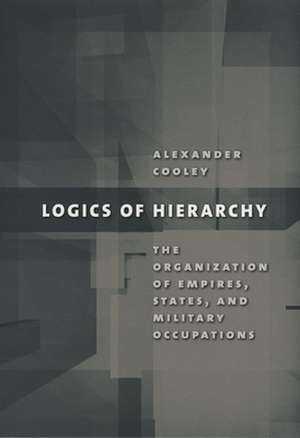Logics of Hierarchy – The Organization of Empires, States, and Military Occupations
Autor Alexander Cooleyen Limba Engleză Paperback – 14 noi 2008
In Logics of Hierarchy, Alexander Cooley applies this model to political hierarchies across different cultures, geographical settings, and historical eras to explain a variety of seemingly disparate processes: state formation, imperial governance, and territorial occupation. Cooley illustrates the power of this formal distinction with detailed accounts of the experiences of Central Asian republics in the Soviet and post-Soviet eras, and compares them to developments in the former Yugoslavia, the governance of modern European empires, Korea during and after Japanese occupation, and the recent U.S. occupation of Iraq.
In applying this model, Logics of Hierarchy reveals the varying organizational ability of powerful states to promote institutional transformation in their political peripheries and the consequences of these formations in determining pathways of postimperial extrication and state-building. Its focus on the common organizational problems of hierarchical polities challenges much of the received wisdom about imperialism and postimperialism.
| Toate formatele și edițiile | Preț | Express |
|---|---|---|
| Paperback (1) | 143.22 lei 3-5 săpt. | |
| MB – Cornell University Press – 14 noi 2008 | 143.22 lei 3-5 săpt. | |
| Hardback (1) | 377.57 lei 3-5 săpt. | |
| MB – Cornell University Press – 14 noi 2005 | 377.57 lei 3-5 săpt. |
Preț: 143.22 lei
Nou
Puncte Express: 215
Preț estimativ în valută:
27.41€ • 28.54$ • 23.16£
27.41€ • 28.54$ • 23.16£
Carte disponibilă
Livrare economică 14-28 februarie
Preluare comenzi: 021 569.72.76
Specificații
ISBN-13: 9780801474835
ISBN-10: 0801474833
Pagini: 208
Dimensiuni: 152 x 229 x 16 mm
Greutate: 0.28 kg
Editura: MB – Cornell University Press
ISBN-10: 0801474833
Pagini: 208
Dimensiuni: 152 x 229 x 16 mm
Greutate: 0.28 kg
Editura: MB – Cornell University Press
Notă biografică
Descriere
Reveals the varying organizational ability of powerful states to promote institutional transformation in their political peripheries and the consequences of these formations in determining pathways of postimperial extrication and state-building.
